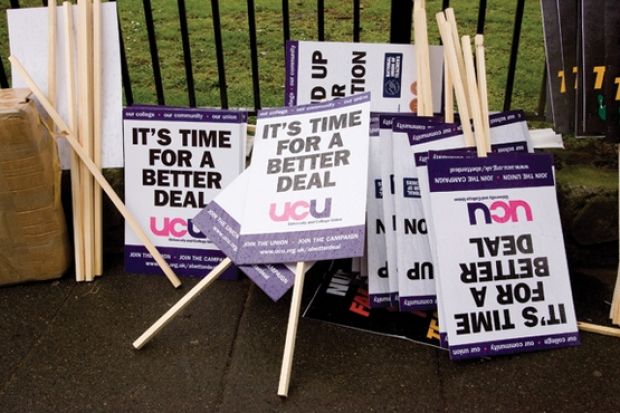A battle for control of the University and College Union is under way, as the powerful Left group plans a leadership challenge following a split over support for student protests.
The turmoil within the organisation, which represents about 120,000 staff in higher and further education, is evident in threats of strike action by the union's own staff, while Sally Hunt, general secretary, has said that union strategy is being directed by "bodies outside UCU".
Vice-chancellors will be alarmed by the prospect of the union swinging further to the left, which could result in a harder line on strikes and direct action in response to public funding cuts.
The UCU is already set to ballot for strikes over job security and pensions later this month.
The UCU Left, a key presence on the union's national executive committee (NEC), successfully pressed for the union to officially "mobilise" for the next London student protest on 29 January.
The protest is being organised by new student groups to the left of the National Union of Students, and is opposed by the NUS leadership. The UCU has a joint campaigning agreement with the NUS.
Ms Hunt strongly opposed supporting the march. In a report to an NEC meeting last month where the decision was made, she refers to violence that marred the December march and warns of "long-term damage" to the union's interests and relationship with the NUS.
As divisions widen, Times Higher Education understands that the UCU Left is planning to field a candidate against Ms Hunt in elections for the general secretary's post later this year.
Meanwhile, UCU officers have threatened industrial action after motions put to the NEC called for elected union representatives to take charge of organisation of future demonstrations. The motions - from the higher education committee and leading UCU Left member Tom Hickey - came after some members criticised union officers' handling of previous protests.
In a letter to Ms Hunt, the press, campaigns and parliamentary officers say they are "deeply upset and angry" at the perceived "denigration and belittling of our efforts", and say that parts of the union's dignity at work policy "have been, or are in danger of being, breached".
Critics of the UCU Left note that many of its key figures are members of the Socialist Workers Party (SWP), arguing that this subjects the union to external influence.
In her report, Ms Hunt says the NEC motions view the NUS and other unions "as little more than appendages to UCU's grand strategy, which itself seems to be directed by bodies outside UCU rather than our own members".
Jim Wolfreys, an NEC and UCU Left member, rejected talk of division and said the NEC had simply approved decisions that were "unanimously passed at further education committee, higher education committee, or both" and at the sector conference.
"What we really need is a united union going into the ballot," he added.
Opponents of the UCU Left say the final motion differs from that passed by the higher education committee, criticising the final version for failing to commit to the NUS or to non-violent protest.
Despite the final motion toning down calls for elected members to take over campaigning, a union source said industrial action by the officers remained "a very real threat".
The officers, most of whom are members of the Unite union, fear their contracts would be altered by moves to give lay members stronger roles.
Critics of the officers claimed the official UCU-NUS rally on 9 December was a diversion from the larger march held by the left student groups on the same day, exposing demonstrators to "police violence".
As with that march, the next London event is organised by the Education Activist Network (which has links to the UCU Left and the SWP) and the National Campaign Against Fees and Cuts.
The UCU Left says on its website that support for the London protest was needed to restart campaigning in the new year and offer "trade union solidarity with the students...in the face of intimidatory police tactics".
However, Ms Hunt wants the union to prioritise good relations with the NUS leadership, believing its support is key to the success of any staff strikes. She also warns that the London event clashes with a Trades Union Congress youth rally in Manchester on the same day.
In motions to an emergency NUS meeting scheduled for 10 January, NUS president Aaron Porter proposes to reject calls for the London march. He criticises police tactics on marches, but cautions: "Violent demonstrators have lost us considerable public support."
Register to continue
Why register?
- Registration is free and only takes a moment
- Once registered, you can read 3 articles a month
- Sign up for our newsletter
Subscribe
Or subscribe for unlimited access to:
- Unlimited access to news, views, insights & reviews
- Digital editions
- Digital access to THE’s university and college rankings analysis
Already registered or a current subscriber? Login
